11 Best Steps To Building Positive Customer Relations
Discover strategies for building strong customer relationships, driving loyalty, and increasing sales through personalized experiences along with effective communication.
Every business wants to be different than the others in the market. They try everything and no stone is left unturned to make the customers happy as well as improve the customer relations!
But, why do you strive for it?
Obviously for customer retention. Having a good customer relationship easily translates to repeat business and long-term growth.
In fact, back in 2022, the fastest-growing priority amongst the surveyed customer service leaders was to give the best customer experience! On that note, let’s explore more about the significance of customer relations and how businesses can leverage strong relationships with their customers to drive success.
Customer relations is the practice of building and maintaining strong relationships with customers to enhance their overall satisfaction as well as loyalty to a brand. It involves understanding the needs as well as preferences of customers, addressing their concerns while also providing solutions to their problems and creating a positive experience that will keep them coming back.
Customer relations extends beyond basic customer service by proactively building emotional connections and trust. It encompasses strategic communication, feedback collection, and relationship nurturing to transform satisfied customers into brand advocates.
Key objectives:
Customer relationship management (CRM) is a strategy that companies use to manage interactions with current and potential customers. The goal of CRM is to improve business relationships, drive sales growth and retain customers by providing a personalized experience based on their requirements.
Think of CRM as the technological backbone that transforms scattered customer information into actionable insights. It creates a unified view of each customer’s journey, enabling businesses to anticipate needs, personalize communications, and deliver consistent experiences across all touchpoints.
Key elements:
Customers are the lifeblood of a company and without them, a business cannot survive. As a matter of fact, companies observe a staggering increase of revenue (over 80%), when they focus on CX.
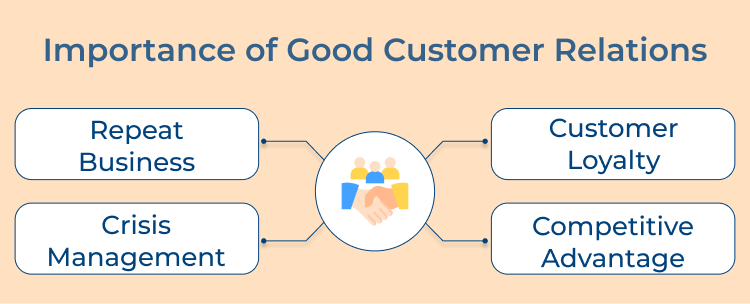
3 out of 4 customers say that a bad interaction with the business ruins their day – and we don’t want that to happen. To have a lasting impact, we need to come up with a fool-proof plan. Begin by strategizing a customer experience that is positive and also fulfilling.
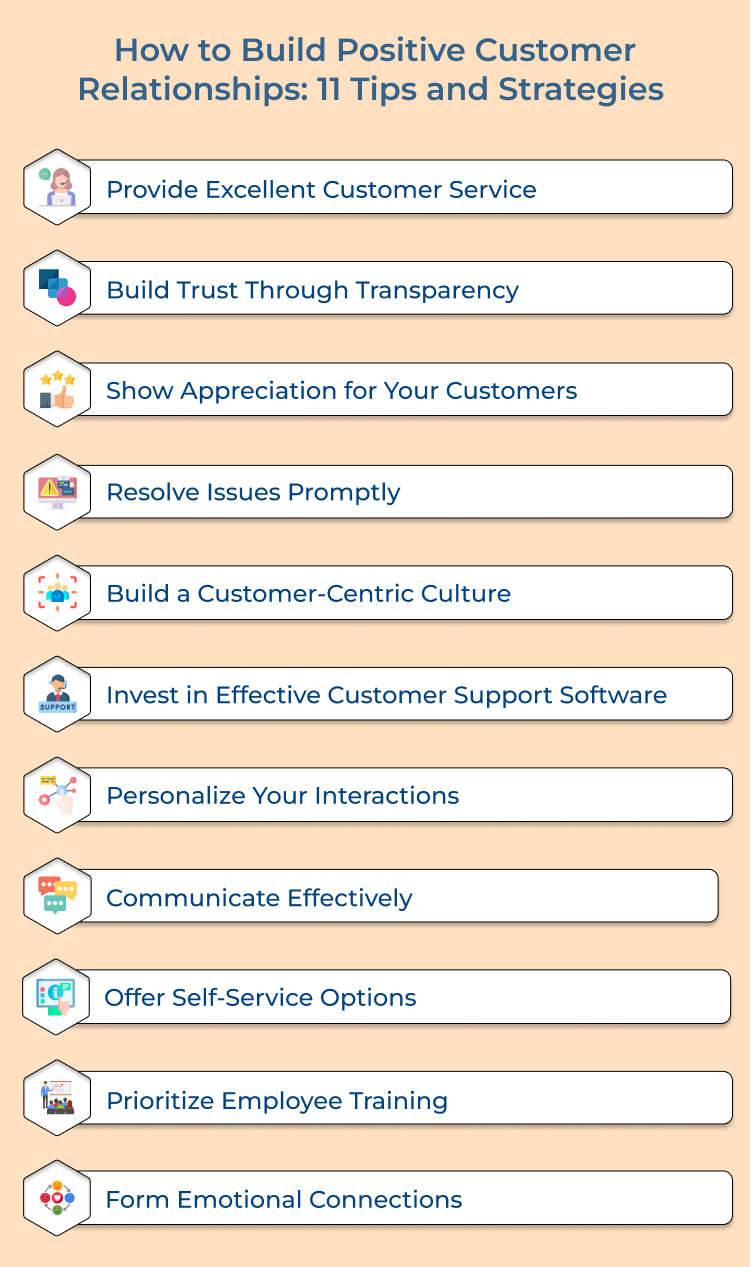
One of the most important factors in building positive customer relationships is providing excellent customer service. It means going above and beyond to meet the expectations of your customers. Respond promptly to inquiries and resolve issues quickly. Show your customers that you care about their satisfaction and are willing to do whatever it takes to make things right.
Trust is the foundation of any successful relationship, including those between businesses and customers. Be transparent and honest in your interactions with customers. If there are any issues or mistakes, own up to them and work to make things right. Building trust with your customers will lead to stronger and more positive relationships in the long run.
It’s important to show your customers that you appreciate their business. A simple thank you can go a long way in making your customers feel valued and appreciated. Consider sending personalized thank you notes or offering special discounts to show your gratitude. When customers feel appreciated, they are more likely to continue doing business with you.
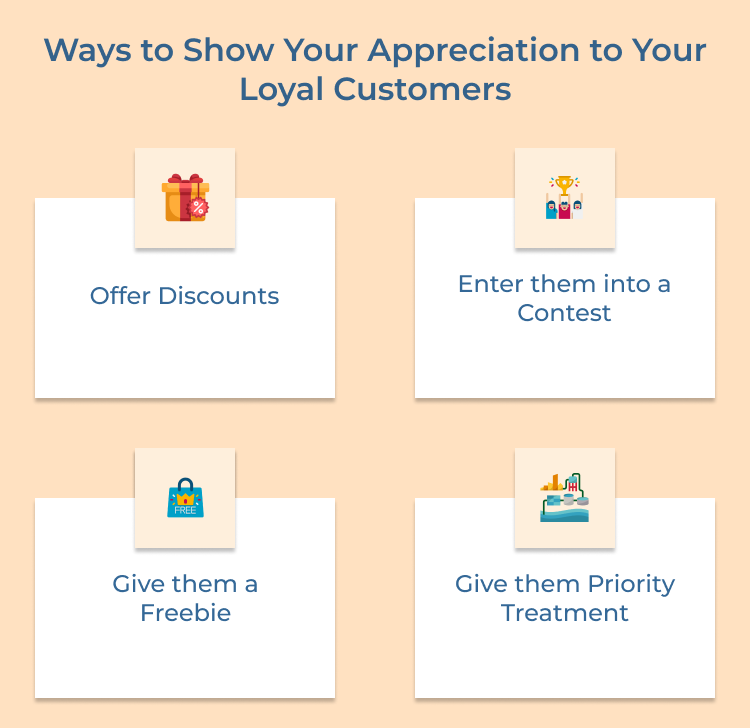
No matter how well you provide customer service, problems are bound to arise from time to time. The key is to address these issues effectively. Listen to your customer’s concerns, apologize for any mistakes, and work to find a solution that satisfies both parties. By resolving issues quickly, you turn a negative experience into a positive one and strengthen your relationship with the customer.
Creating a customer-centric culture within your company is essential for building positive customer relationships. Make sure that every employee, from the CEO to the entry-level staff, understands the importance of customer satisfaction and is committed to providing excellent service.
To provide excellent customer support, it’s important to invest in the right tools and technology. Effective customer support software helps you streamline your customer service operations, track customer interactions and resolve issues more efficiently. The right software leads to providing a seamless and satisfying customer experience.
6 out of 10 customers appreciate personalized recommendations they receive from the brand. Use customer insights to tailor your offers to the individual preferences of each customer. Personalization builds you a stronger relationship with customers and increases their loyalty to your brand.
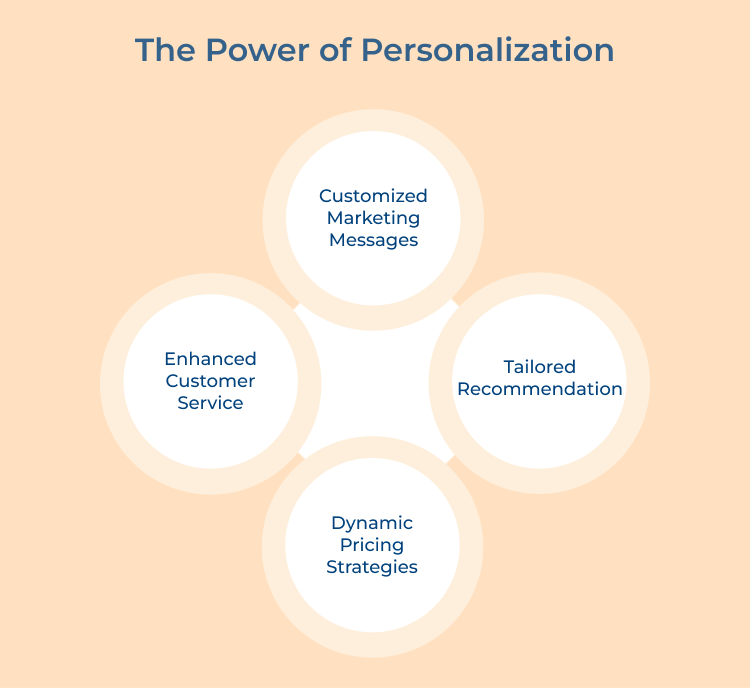
Clear, open and consistent communication is essential for building positive customer relationships. Keep your customers informed about any changes, updates, or promotions that may affect them. Listen to their feedback and respond promptly to their inquiries as well as concerns. Effective communication is the only way to build good customer relations for a longer time.
SurveyMonkey finds that 52% of the customers are interested in AI that helps them gather information about products and feature experience. This means that they prefer to find answers to their questions on their own. So, offer them what they need through online FAQs, chatbots, consumer portals etc. You empower your customers to have the freedom to resolve their problems quickly and hassle-free.
Your employees are the face of your company and are the ones that build positive customer relationships. Make sure to prioritize employee training and development to ensure that your staff is equipped with the knowledge as well as skills they need to provide excellent customer service. Invest in ongoing training programs to keep your employees up-to-date on best practices and industry trends.
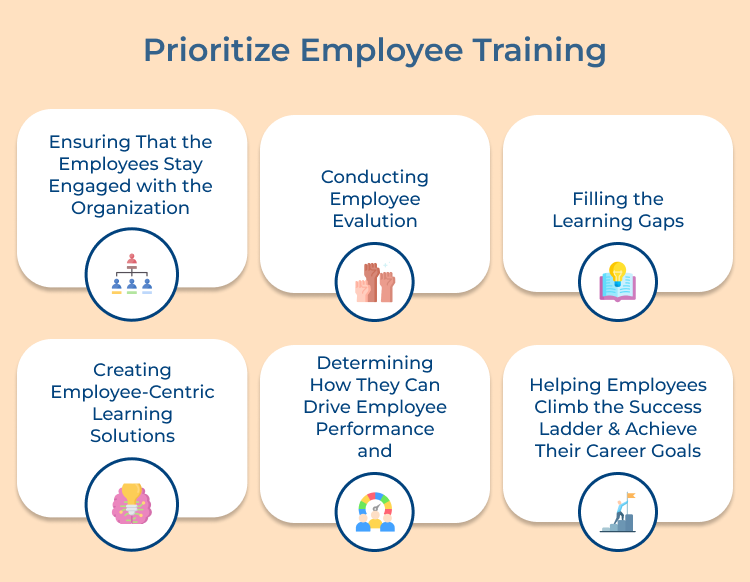
Finally, building positive customer relationships often comes down to forming emotional connections with your customers. Show compassion, understanding and empathy in your interactions with customers. Take the time to get to know them, remember their preferences – make them feel valued and appreciated. When you form an emotional connection, you create loyal customers that support you through all the thick and thin.
The customer experience management market is expected to grow at a compound annual growth rate (CAGR) of 15.4% from 2023 to 2030. Now let’s learn how it benefits the business:
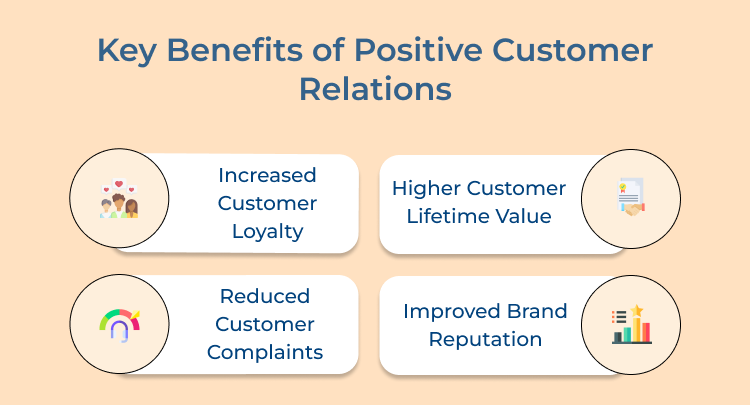
When customers have positive interactions with a business feeling valued and appreciated, they are more likely to become loyal customers. Loyal customers return to the business for future purchases, which leads to increased sales and revenue over time.
A positive customer experience snowballs down to continued product purchases, higher customer lifetime value as well as increase in the total revenue for the company. When you build strong relationships with customers, they tend to become more friendly and affirmative to your brand’s product launches.
A satisfied customer is the one that is happy with the experience your brand has offered. Addressing customer complaints effectively de-escalates a bad experience that might damage the company reputation. A positive customer relation is when there are lesser customer complaints and improved experience.
Positive customer relations can help build a strong brand reputation and differentiate a business from its competitors. When customers feel satisfied and valued, they are more likely to trust the business along with its products or services. A positive brand reputation helps attract new customers, retain existing customers and create a loyal customer base that is willing to recommend the business to others.
Customer relations employees play a key role in ensuring customer satisfaction and loyalty. But what exactly makes a great customer relations employee?
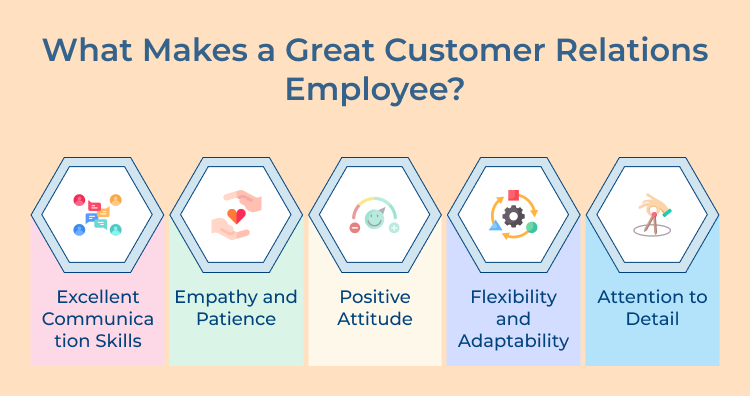
Building strong customer relationships is essential for every business. There are several key types of customer relationships that businesses can focus on to ensure customer loyalty.
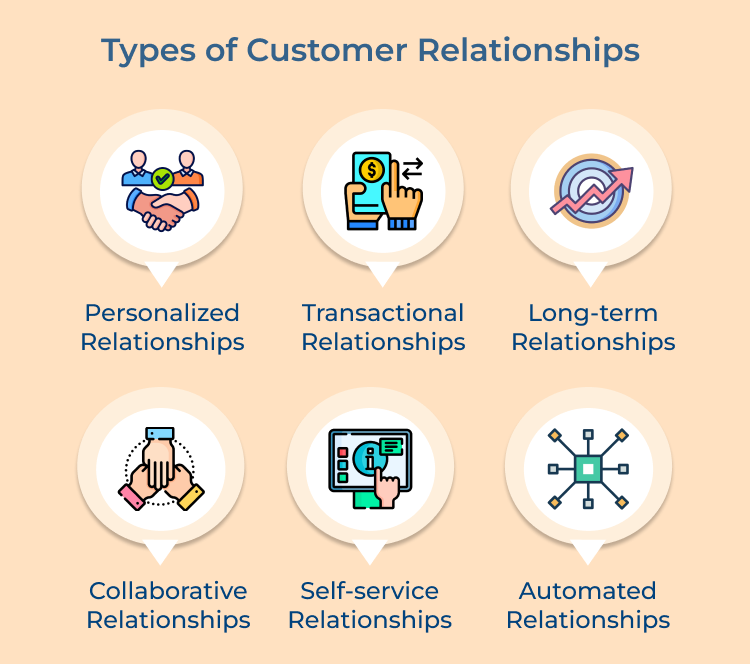
Personalized relationships involve tailoring your products or services to meet the individual needs and preferences of each customer. It can involve collecting data on customer behavior & preferences as well as using that information to provide personalized recommendations.
Transactional relationships are focused on completing a single transaction with a customer. This type of relationship is often used in retail and e-commerce businesses, where customers make one-time purchases without the expectation of repeat business.
Long-term relationships involve building a strong customer bond over time with the goal of retaining their loyalty and repeat business. This type of relationship requires ongoing communication, excellent customer service and a focus on building trust.
Collaborative relationships involve working closely with customers to co-create value. It could involve customers in the product development process, seeking their feedback on new ideas or partnering with them on mutual projects or initiatives.
Self-service relationships are focused on empowering customers to find the information they need and make purchases on their own, without the need for direct interaction with a sales or customer service representative. This type of relationship is common in e-commerce and online businesses.
Automated relationships involve using technology to streamline customer interactions and provide personalized experiences at scale. It could involve using chatbots to answer customer inquiries, sending automated emails with personalized recommendations, or using AI to analyze customer data and predict future behavior.
One of the best ways to build positive customer relations is by utilizing the right platforms that help you manage and nurture these relationships effectively.

Omni24 is a robust customer engagement platform that can help businesses build positive relationships with their customers. With a focus on communication and interaction, Omni24 offers a range of features aimed at enhancing customer satisfaction as well as loyalty.
Key Features:
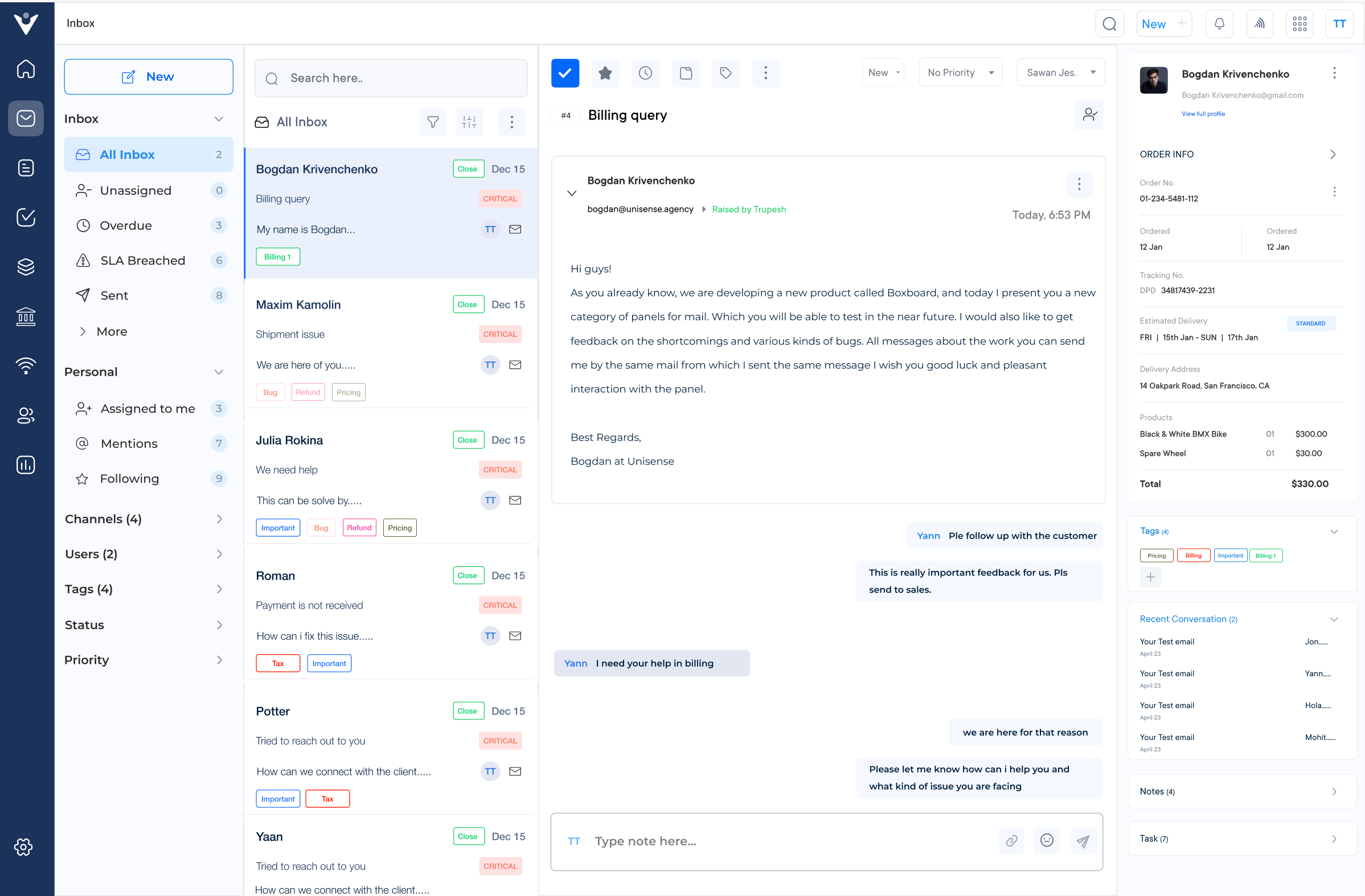
Veemo is a powerful platform that helps businesses build positive customer relationships through efficient communication channels and streamlined processes. With its wide range of features and capabilities, Veemo has become a go-to solution for companies looking to enhance their customer support as well as engagement efforts.
Key Features:
HubSpot is an inbound marketing and sales platform that offers a range of tools to help businesses attract as well as engage customers. With HubSpot, you can create personalized marketing campaigns, track customer interactions and manage your sales pipeline all in one place.
The platform also provides detailed analytics and insights to help you better understand your customers as well as tailor your strategies accordingly. By using HubSpot, businesses can build stronger relationships with their customers through targeted and meaningful interactions.
MailChimp is a popular email marketing platform that allows businesses to create and send targeted campaigns to their customers. MailChimp helps you segment your email list, create engaging content and track the performance of your campaigns.
The platform also offers automation features, allowing you to send personalized messages at the right time to the right customer. Businesses here stay connected with their customers, provide valuable information and build trust over time.
Building strong connections with your customers is essential for any business looking to succeed in today’s competitive market. By focusing on creating genuine relationships with your customers, you can gain their trust, loyalty and advocacy. Through effective communication, personalized experiences and consistently delivering on promises, you can strengthen your customer relations.
Remember to always listen to your customers, address their needs/concerns and show appreciation for their support. By prioritizing customer relations and continuously improving your strategies, you can create long-lasting connections that will benefit your business for years to come. Strengthening customer relations is the key to success.
Who is responsible for building and maintaining customer relationships?
In a company, everyone plays a role in building and maintaining customer relationships. From the customer service team to the sales department, marketing team and even upper management, every employee should prioritize customer satisfaction as well as work towards building long-lasting relationships with customers.
What functions do customer relations include?
Customer relations include a variety of functions aimed at creating positive interactions with customers. It can include responding to customer inquiries/complaints, providing helpful information and assistance, managing customer feedback, while also working to exceed customer expectations. Overall, the goal of customer relations is to ensure that customers feel valued and satisfied with their interactions.
What are positive customer relations?
Positive customer relations refer to the interactions that customers have with a company that leave them feeling satisfied, valued and likely to continue doing business with the company. It can include providing excellent customer service, addressing customer concerns effectively, as well as going above and beyond to meet customer needs.
How to maintain customer relationships?
To maintain customer relationships, it’s essential to communicate regularly with customers and listen to their feedback. Offering personalized experiences, such as remembering customer preferences and past interactions, can also help strengthen relationships. Providing excellent customer service, being transparent & honest with customers and following up to ensure customer satisfaction are all key components of maintaining positive customer relationships.